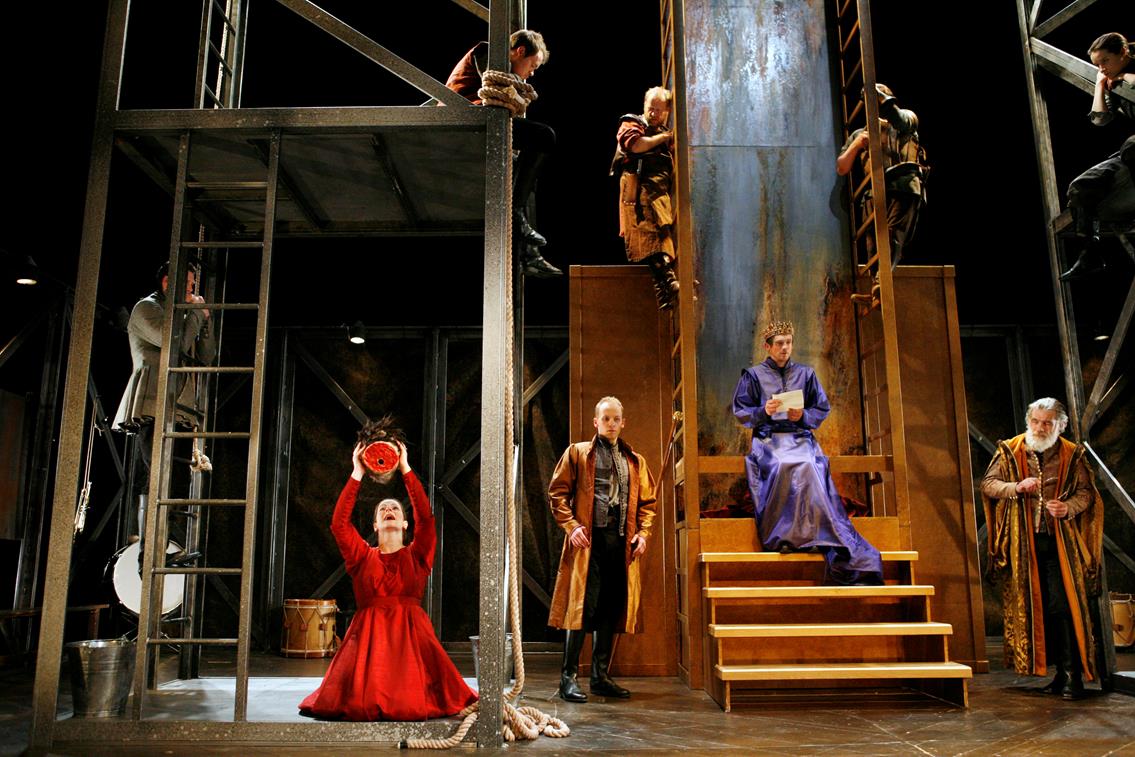There really is no finer way to spend a weekend than feasting on Shakespeare plays and this has been one hell of a memorable weekend gorging on the great man’s words.
Four plays in 48 hours. The first, Kenneth Branagh’s Macbeth on Saturday afternoon, set the bar of expectation very high.
Then 50-odd miles away to the historic North Yorkshire battlefield of Towton, between Leeds and York, where Shakespeare’s Globe was on the first of its tours of the battlefields. This was the site of one of the bloodiest battles of the War of The Roses in 1461.
The trio of King Henry VI plays – a series of performances spread across nine hours – was no less beguiling than the Branagh production of Macbeth. Both productions required masses of stamina to perform in the heat, but the Globe’s production necessitated an almost Herculean effort.
Never did two sets feel so starkly different: the claustrophobic intense cauldron of a deconsecrated Manchester church replaced now by the rolling fields and chocolate box villages. Overall, what struck me in North Yorkshire was the outstanding beauty – and tragedy -of the setting. You feel the hand of history on your shoulder and the distant battle cries of your ancestors as sheep bleat and cockerels crow in the far distance. This was the actual battlefield and the impact of the location was not lost on the audience.
It is levelling to think that up to 32,000 people died in these fields in the snow in March, particularly on a sweltering 21st century day as temperatures crept up to the mid 80s.
It requires incredible strength to perform the trilogy, directed trimphantly by Nick Bagnall. The 14 actors, each playing more than 100 roles, didn’t disappoint.
The Globe’s artistic director explains that it’s difficult for people to remember that English theatre used to be about touring. Theatre buildings are the newcomers in theatre culture, which explains the decision to tour in this way. And, since resurrecting the tradition six years ago, the Globe tours have gathered apace.
I’m ashamed to say that I didn’t make it through to The True Tragedy of the Duke of York; I was bushwhacked after watching three powerful Shakespeare plays in 24 hours. My head was pounding. But I really wished I could have stayed as the Duke of York ended up with his head stuck on the city gates for “York to look upon York”.
 Percussion was vital to the performances, thundering drums and occasional trumpet, the swords clattering metal on metal. I was sat behind some re-enactors in their traditional garb, taking sips out of an earthenware goblet and with dagger-like weapons encased in leather and pouches at their hip.
Percussion was vital to the performances, thundering drums and occasional trumpet, the swords clattering metal on metal. I was sat behind some re-enactors in their traditional garb, taking sips out of an earthenware goblet and with dagger-like weapons encased in leather and pouches at their hip.
As for the staging it was austere, a melange of twin scaffolding towers, medieval costume and props from the present time.
Graham Butler was a constant in the history as an excitable, immature Henry VI who’s full of contradictions. A man too young to wield such power. “The right King at the wrong time.” He’s perched on the tower, reading his book when we first see him. Later, in the queue for the loos, he walked past in vivid blue costume, a little bashful as the audience gaped at him.
During the first half, around four people were following the text on their Kindles or tablet computers but the modern century gadgets were soon discarded as sanctuary from the sun was sought in the shade of a large tree directly opposite the set.
The actors fight imaginary swordsmen with real swords, miming the other fighter. This worked for me, I thought it was effective while I loved Beatriz Romiley as Joan of Arc with her thick Yorkshire accent, intoning the word glory as glawry. When she bemoaned the French for turning and turning again, it felt like the rhetoric of Margaret Thatcher and prompted a hearty laugh from the audience.
While the dialogue was not as memorable and accomplished as some of Shakespeare’s later works, he still wove in the imagery of Macbeth – minds whirling like a potter’s wheel and dissension the worm that gnaws at the bowels of Commonwealth.
When Joan of Arc is sentenced to death, Romiley came into her own, arms outstretched with a rope round her neck, railing to the end as shouts of “burn ‘er burn er hanging’s too good for her,” rang round the stage.
The Houses of York and Lancaster is a complex plot that lays bare the divisions between the white and red rose counties and the rivalry between Gloucester and Winchester. The actors do a great job of making the complex text appealing, although there’s a lull in pace in this second play. However, it picked up somewhat with the Jack Cabe rebellion, with Roger Evans playing the dual roles of Jack and the Duke of Suffolk.
A writer, who was reviewing the trilogy for her Shakespeare-themed blog, wore a red rose in her lapel. If you’re planning to go, choose your colour wisely.
Review by Helen Carter
What: A trilogy of Henry VI history plays by Shakespeare
Where: Towton battlefield, North Yorkshire. This production is touring other historic battlefields this summer.
When: July 14, 2013 and touring
More info: www.shakespearesglobe.com/theatre/whats-on/globe-theatre-on-tour/henry-vi











